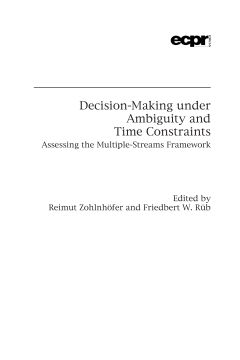
Additional Information
Book Details
Abstract
Policy issues have grown ever more complex and politically more contestable. So governments in advanced democracies often do not understand the problems they have to deal with and do not know how to solve them. Thus, rational problem-solving models are highly unconvincing. Conversely, the Multiple-Streams Framework starts out from these conditions, which has led to increasing interest in it. Nevertheless, there has not yet been a systematic attempt to assess the potential of such scholarship. This volume is the first attempt to fill that gap by bringing together a group of international scholars to assess the strengths and weaknesses of the Framework from different angles. Chapters explore systematically and empirically the Framework's potential in different national contexts and in policy areas from climate change and foreign policy to healthcare and the welfare state.
Reimut Zohlnhöfer is a professor of political science at the University of Heidelberg. He received a Master’s degree in political science from the University of Heidelberg and a PhD in political science from the University of Bremen. Afterwards he was assistant professor in Heidelberg, and John F Kennedy Memorial Fellow at the Center for European Studies, Harvard University. He became a professor of comparative public policy at Otto-Friedrich-University, Bamberg, in 2008 before returning to Heidelberg in 2011. He has published in many leading political science journals including Comparative Political Studies, Governance, Journal of Comparative Policy Analysis, Journal of European Public Policy, Journal of European Social Policy, Journal of Public Policy, Social Policy and Administration, and West European Politics. He is also the editor of numerous volumes and special issues, the most recent of which include Developments in German Politics 4 (Palgrave 2014; with Stephen Padgett and William Paterson).
Friedbert W Rüb is a professor of political sociology and social policies at Humboldt University of Berlin. He received a diploma in political science, sociology and history and a PhD in political science from the University of Hannover. Afterwards he was, among others, Fellow of the Collegium Budapest and assistant professor at the University of Heidelberg. In 2002 he become a professor at the University of Hamburg and moved to Humboldt University of Berlin in 2008. He has published on democratisation processes in Eastern Europe, on social policies (healthcare, pension policies etc) in Germany, on political parties, and on governance problems in the German Republic. He is also co-editor of two special issues of German Policy Studies concerning changes to the Bismarckian welfare state.
Table of Contents
| Section Title | Page | Action | Price |
|---|---|---|---|
| Decision-Making under Ambiguity and Time Constraints | i | ||
| Table of Contents | v | ||
| List of Figures and Tables | vii | ||
| List of Abbreviations | ix | ||
| Contributors | xi | ||
| Preface | xv | ||
| Chapter One Introduction: Policy-Making under Ambiguity and Time Constraints Reimut Zohlnhöfer and Friedbert W. Rüb | 1 | ||
| Part One The Theoretical Assumptions of the Multiple-Streams Framework | 19 | ||
| Chapter Two Lost in Translation: Re-conceptualising the Multiple-Streams Framework Back to its Source of Inspiration Harald Sætren | 21 | ||
| Chapter Three Clear Enough To Be Proven Wrong? Assessing the Influence of the Concept of Bounded Rationality within the Multiple-Streams Framework Johanna Kuhlmann | 35 | ||
| Chapter Four Agenda-Setting and Policy-Making in Time: What the Multiple-Streams Approach Can Tell Us – and What It Cannot Friedbert W. Rüb | 51 | ||
| Part Two The Elements of the Multiple-Streams Framework | 71 | ||
| Chapter Five Kingdon à la Carte: A New Recipe for Mixing Stages, Cycles, Soups and Streams Michael Howlett, Allan McConnell and Anthony Perl | 73 | ||
| Chapter Six Refining the Idea of Focusing Events in the Multiple-Streams Framework Thomas A. Birkland and Megan K. Warnement1 | 91 | ||
| Chapter Seven Framing the Problem: Knowledge-Brokers in the Multiple-Streams Framework Åsa Knaggård | 109 | ||
| Chapter Eight Clarifying the Concept of Policy-Communities in the Multiple-Streams Framework Nicole Herweg | 125 | ||
| Chapter Nine Political Leadership, Multiple Streams and the Emotional Endowment Effect: A Comparison of American and Greek Foreign Policies Nikolaos Zahariadis | 147 | ||
| Part Three The Applicability of the Multiple-Streams Framework in Parliamentary and Multi-Level Systems | 167 | ||
| Chapter Ten How Well Does the Multiple-Streams Framework Travel? Evidence from German Case Studies Reimut Zohlnhöfer and Christian Huß | 169 | ||
| Chapter Eleven The Expulsion of the Smokers from Paradise: A Multiple-Streams Analysis of German Non-Smoker-Protection Legislation Iris Reus | 189 | ||
| Chapter Twelve Crisis Policy-Making: Traceable Processes of Multiple Streams Dan Hansén | 213 | ||
| Chapter Thirteen Reinterpreting the Multiple-Streams Framework from a Process Approach: Decision-Making and Policy-Shift in Public Health Management in Catalonia, 2003–7 Raquel Gallego, Nicolás Barbieri and Sheila González1 | 231 | ||
| Chapter Fourteen Path-Departing Labour-Market Reforms in the United Kingdom and Sweden: An Analysis Combining the Multiple-Streams Framework and Historical Institutionalism Florian Spohr | 251 | ||
| Index | 271 |
